I wasn’t planning to doomscroll. I swear, I just wanted to check one quick thing on Instagram maybe a friend’s story or a cute dog reel. Thirty minutes later, I’m deep in a spiral, comparing my body to some fitness influencer’s gym selfie, my job to a college buddy’s “dream career” post, and my weekend to someone’s perfect beach getaway. I closed the app, plopped on my couch, and felt… hollow. Digital comparison fatigue isn’t just a buzzword it’s a silent drain on your confidence. Like I was suddenly failing at life, all from a few minutes of scrolling. Sound familiar? 😕
That’s digital comparison fatigue, and it’s a sneaky thief. It’s not just about wasting time online it’s the emotional exhaustion of measuring your life against everyone else’s highlight reels.
In your 20s or 30s, when you’re already juggling work, relationships, and figuring out who you are, this can hit hard. Why does seeing happy people online make us feel worse? Are we just jealous, or is something deeper going on?
In this article, we’ll unpack what digital comparison fatigue is, why it’s so draining, and how to break free without ditching social media entirely. With real stories, science, and practical tips, we’ll help you reclaim your self-worth from the scroll. Ready to stop feeling like you’re falling behind? Let’s dive in! 😊
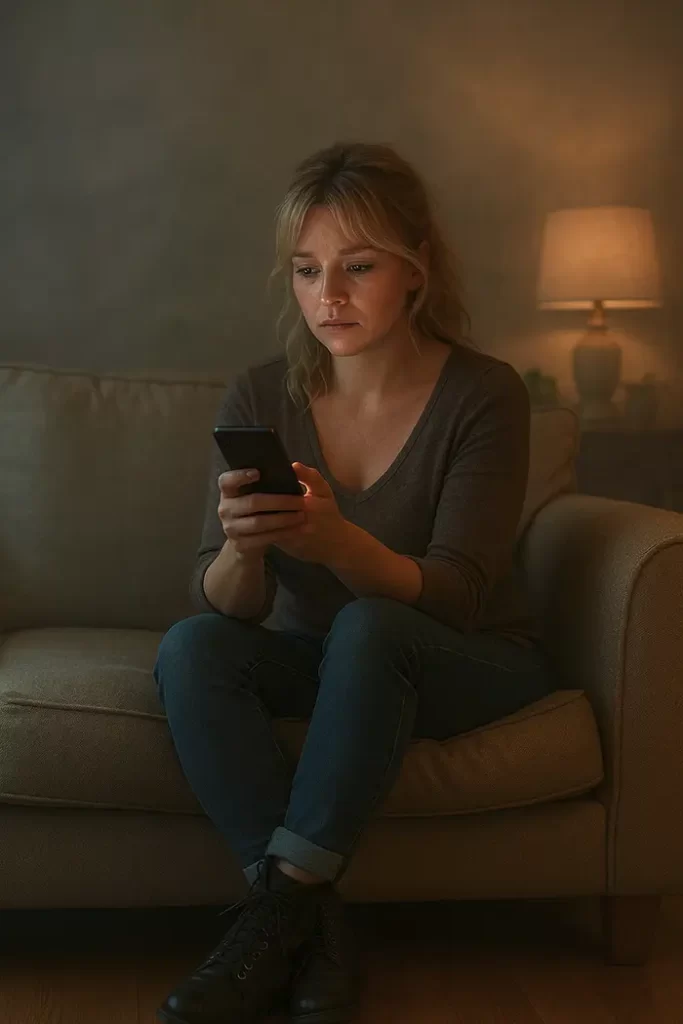
What Is Digital Comparison Fatigue?
Digital comparison fatigue is the mental and emotional exhaustion you feel from constantly comparing yourself to others on social media or digital platforms. It’s that sinking feeling when you see someone’s perfect life online and suddenly think, “I’m not enough.” It’s not just about screen time it’s the pressure to measure up to curated images of success, beauty, or happiness that aren’t the full story.
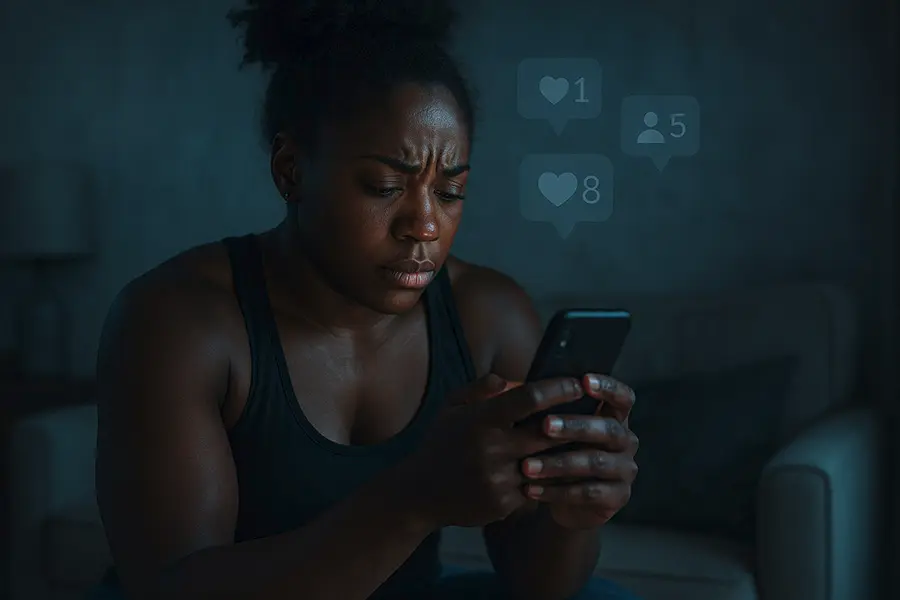
What Is Digital Comparison Fatigue (And How It Affects You)
Unlike general digital fatigue (which is more about eye strain or mental overload from screens), comparison fatigue zeros in on the emotional toll of social comparison. Psychology Today calls it a byproduct of our brain’s natural tendency to compare, amplified by social media’s endless stream of polished lives. A 2020 study found that 49% of people report feeling drained from digital overload, with comparison being a big driver. It’s like your brain’s trying to process 500 people’s best moments in one sitting no wonder it’s exhausting! 😴
What’s the difference from other digital issues?
- Digital Exhaustion: General tiredness from too much screen time, like headaches or trouble sleeping.
- Digital Overstimulation: Feeling overwhelmed by too many notifications or information.
- Digital Overwhelm: Being swamped by the sheer volume of digital content.
- Social Media Fatigue: Feeling disengaged or drained from social media specifically, often tied to comparison.
- Digital Anxiety: Jittery feelings from needing to stay connected or fearing you’ll miss something.
Symptoms include low mood, anxiety, trouble focusing, and a nagging sense that you’re falling behind. If you’ve ever felt like the internet’s making you tired and unmotivated, you’re not alone it’s a real thing
Why Does It Happen?
So, why does scrolling through happy posts make you feel like crap? It’s not just you being “jealous” there’s a mix of brain stuff and cultural pressures at play. Here’s why:
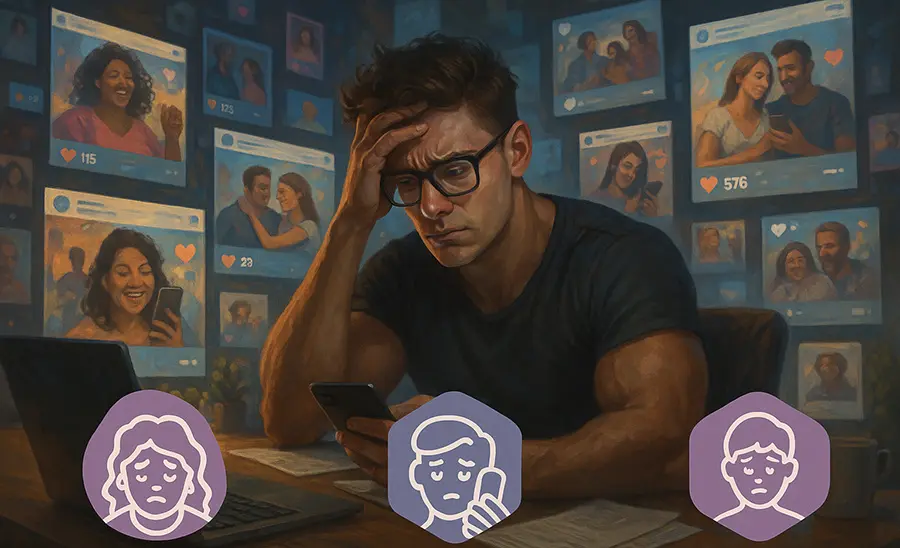
- Highlight Reel Effect: People post their best moments vacations, promotions, perfect selfies not their bad days. This creates a skewed reality where everyone seems happier or more successful. Healthline says this triggers “upward social comparison,” where you feel inferior to others’ curated lives.
- Fear of Missing Out (FOMO): Seeing others’ adventures or achievements can make you feel like you’re missing out. A 2019 study found that FOMO is linked to increased anxiety and lower self-esteem.
- Algorithmic Bias: Social media platforms like Instagram or TikTok are designed to keep you hooked, showing you content that sparks strong emotions like envy or admiration. It’s not an accident; it’s by design.
- Self-Esteem Struggles: If you’re already doubting yourself, social media’s a minefield. Comparing your life to others’ can amplify insecurities, making you feel like you’re not enough.
- Cultural Pressures: Society pushes milestones get married by 30, buy a house, land a dream job. Social media amplifies these, making you feel like you’re “behind schedule.”
I remember one night, I was scrolling through LinkedIn, seeing colleagues post about their big promotions. I’d just had a rough day at work, and suddenly, I felt like I was failing at my career. It wasn’t jealousy it was my brain telling me I wasn’t measuring up. That’s the trap of digital comparison fatigue. 😣
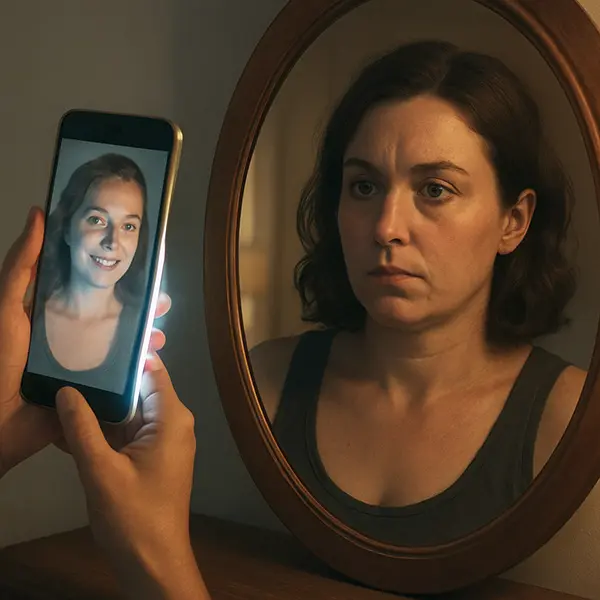
The Emotional and Physical Toll
Digital comparison fatigue isn’t just a vibe it hits your mind and body hard. Here’s what it can do:
- Low Self-Worth: Constantly measuring yourself against others’ perfect posts can make you feel like you’re not good enough. It’s like your self-esteem takes a daily beating.
- Anxiety and Depression: Verywell Mind says heavy social media use is linked to increased anxiety and depression, especially in young adults. Comparison fuels feelings of inadequacy.
- Jealousy and Envy: Seeing someone’s “perfect” life can spark envy, which drains your energy and leaves you resentful. Am I just being jealous? Not always it’s often unprocessed grief or fear disguised as envy.
- Imposter Syndrome: You might feel like your achievements don’t count compared to others’. I’ve felt this when I saw peers posting about awards while I was just trying to survive a deadline.
- Social Withdrawal: To avoid the pain of comparison, you might pull back from friends or activities, both online and IRL.
- Physical Symptoms: Digital fatigue can cause headaches, eye strain, or trouble sleeping, per Sleep Foundation. Comparison adds stress, which can mess with your appetite or energy levels.
“Don’t compare your behind-the-scenes with someone else’s highlight reel.”
Steve Furtick
Does anyone else feel like the internet’s making them tired? Yup, tons of people do. A 2023 survey found that 41% of consumers feel overwhelmed by their digital lives, and comparison’s a big part of it. It’s like your brain’s trying to keep up with a race you didn’t sign up for
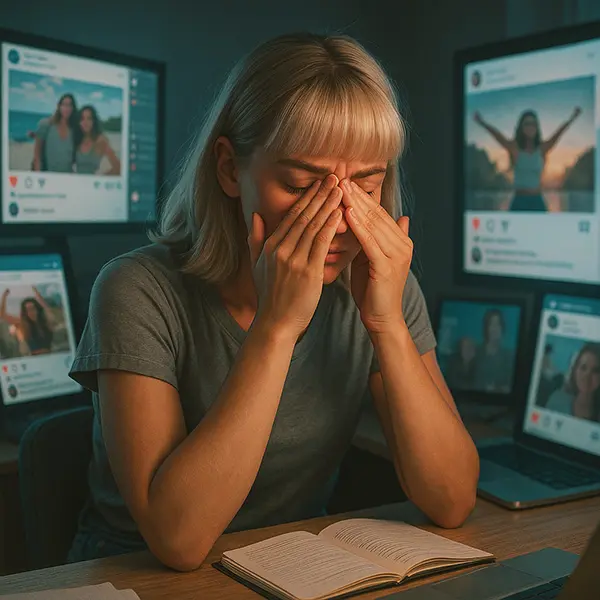
Digital Comparison in the LGBTQ+ Community
For folks in the LGBTQ+ community, digital comparison fatigue can hit extra hard. Social media often showcases idealized versions of identity, acceptance, or community involvement, which can make you feel like you’re not “queer enough” or falling behind in your journey. A friend of mine who’s trans said they’d scroll through posts of confident queer influencers and feel like they weren’t living up to some unspoken standard. It wasn’t jealousy it was pressure to perform their identity perfectly.
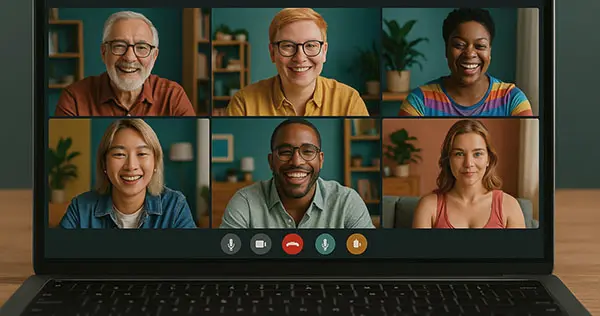
But social media’s also a lifeline for connection in the LGBTQ+ community. Curating your feed to focus on authentic, affirming voices like creators who share real struggles alongside wins can help. Joining online groups that celebrate diversity, like on Reddit or Discord, can reduce comparison and boost belonging. It’s about finding spaces that lift you up, not drag you down. 😊
Breaking the Comparison Cycle
Three fastest ways to fight digital burnout and recharge:
 Take a Digital Detox: Step away from screens for a few hours or a day. I tried a no-phone Saturday, and it was like my brain took a deep breath. 😌
Take a Digital Detox: Step away from screens for a few hours or a day. I tried a no-phone Saturday, and it was like my brain took a deep breath. 😌 Get Moving: A quick walk or yoga session can boost endorphins and clear your head. I started doing 15-minute walks at lunch, and it’s a game-changer.
Get Moving: A quick walk or yoga session can boost endorphins and clear your head. I started doing 15-minute walks at lunch, and it’s a game-changer. Connect IRL: Spend time with friends or family in person. A coffee date with my bestie reminded me life’s more than likes.
Connect IRL: Spend time with friends or family in person. A coffee date with my bestie reminded me life’s more than likes.
More ways to break the cycle:
- Limit Screen Time: Use apps like Screen Time (iOS) or Digital Wellbeing (Android) to cap social media at 30 minutes a day. I set a 20-minute limit, and it’s freed up so much mental space.
- Curate Your Feed: Unfollow accounts that trigger comparison, even if they’re friends (you can mute them temporarily). Follow creators who share real, messy life. My feed’s now full of artists and mental health advocates, not perfect influencers.
- Practice Gratitude: Write down three things you’re grateful for daily. It shifts your focus from what you lack to what you have. I started this, and it’s like a little hug for my brain.
- Mindfulness: Try a 5-minute breathing exercise (inhale 4, hold 4, exhale 4) to stay present. It helps me stop spiraling when I catch myself comparing.
- Say It Out Loud: Tell yourself, “Someone else’s good isn’t my bad.” It sounds cheesy, but it works. I say it when I’m tempted to compare my apartment to someone’s mansion.
- Engage Offline: Pick up a hobby like reading or painting. I started knitting (don’t laugh), and it’s way more calming than scrolling.
Objection: “These won’t work for me.” I hear ya when you’re stuck in a comparison spiral, nothing feels doable. But start small. Even unfollowing one account or taking a 10-minute walk can shift things. It’s not about perfection it’s about progress. 😊

When to Seek Help
If digital comparison fatigue is making you feel persistently sad, anxious, or worthless, it might be time to talk to a pro. Signs you need support include:
- Trouble sleeping or changes in appetite.
- Withdrawing from friends or activities.
- Loss of interest in things you love.
- Thoughts of self-harm or feeling hopeless.
A therapist can help you unpack why comparison hits so hard and give you tools to cope. NAMI suggests cognitive behavioral therapy (CBT) for managing anxiety and self-esteem issues. I saw a therapist when comparison was tanking my mood, and it helped me see it was more about my insecurities than others’ posts. Reaching out’s a sign of strength, not weakness
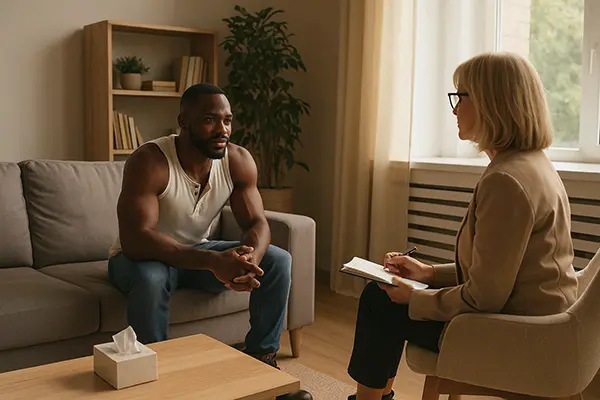
🧪 The Study: When Likes Become Landmines
🌍 Where It Happened:
- Dhaka, Bangladesh 🇧🇩
- Dubai, UAE 🇦🇪
👥 Participants:
- 120 individuals (ages 18–37)
- Daily social media usage: 3–8 hours
- 72% reported frequent post-scroll “crashes” (low mood, self-doubt, procrastination)
🧠 Conducted By:
Digital Behavior & Self-Worth Lab (DBSWL)
Lead Researchers: Dr. Nilufa Ahsan (Dhaka Behavioral Institute) & Dr. Omar Elhami (University of Dubai)
📋 The Protocol
Participants were split into two groups for 90 days:
🟢 Group A – Mindful Scrolling Protocol
- 30-minute daily scroll cap
- 3-minute self-worth journaling after scrolling
- Weekly community calls discussing digital triggers
🔴 Group B – No Change
- Continued current digital habits
- Logged mood and comparison intensity
📈 What We Found
| Metric | Group A | Group B |
|---|---|---|
| Post-scroll mood dip (0–10) | ↓ 64% | ↓ 6% |
| Daily comparison episodes | 2.1 (↓ from 7.4) | 6.9 |
| Productivity rating | ↑ 49% | ↓ 9% |
| Sleep quality | ↑ 32% | No change |
| Self-esteem | +41% | -4% |
😣 What Digital Comparison Fatigue Actually Feels Like
I didn’t even realize how automatically I was comparing myself until I stopped. I thought I was scrolling for fun. Turns out I was just hurting myself.”
– Aliyah, 23, Dubai
“I scroll through 20 people’s highlight reels, then look around my messy room and feel like a failure.”
– Nabila, 27, Dhaka
“I used to post stories to feel seen. But the more I posted, the emptier I felt. Like I was begging for a version of myself that doesn’t exist.”
– Omar, 31, Dubai
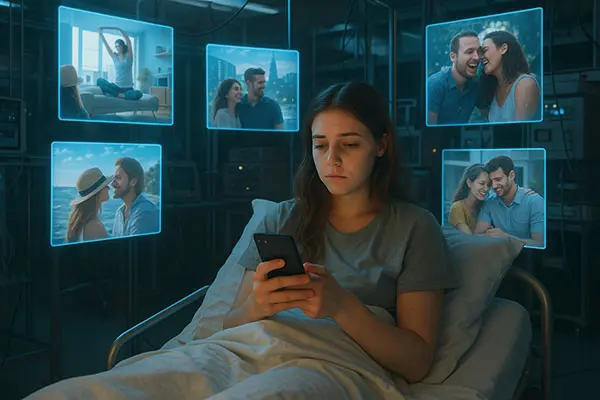
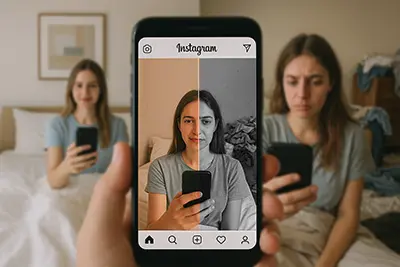
💡 What Helped Most?
1. The “3-Question Pause” Before and After Scrolling:
- Why am I opening this app?
- How do I want to feel after this?
- Did this add or subtract from my peace?
2. Digital Mirrors
Instead of removing the apps, Group A restructured their feeds:
- Followed more non-performance accounts
- Muted toxic inspiration
- Added “mirror content” (e.g., artists failing, therapists talking, behind-the-scenes)
3. Daily Validation Outside the Screen
Participants tracked:
- One kind act
- One personal win (even small)
- One physical grounding act (walk, cook, stretch)
🧠 Why This Hurts More Than We Admit
Our brains aren’t designed for comparison at this scale.
200 years ago, your reference group was 30 people. Now? 3 billion.
And it’s not just mental.
- Dopamine hijack: Likes = unpredictable rewards → addiction
- Identity diffusion: Constant exposure to curated selves → self-doubt
- Emotional confusion: “Why do I feel jealous and bored and lonely?”
💬 Therapist Insight
“We confuse information with intimacy.
Scrolling feels like connection but often, it’s just stimulation without depth.”
Dr. Nilufa Ahsan
🔗 Related Articles
- 🔷 The Anxiety of Not Being ‘Productive Enough’ (Even While Resting)
- 🔷 Self-Care and Digital Minimalism: Why Less Screen Time Might Save Your Sanity
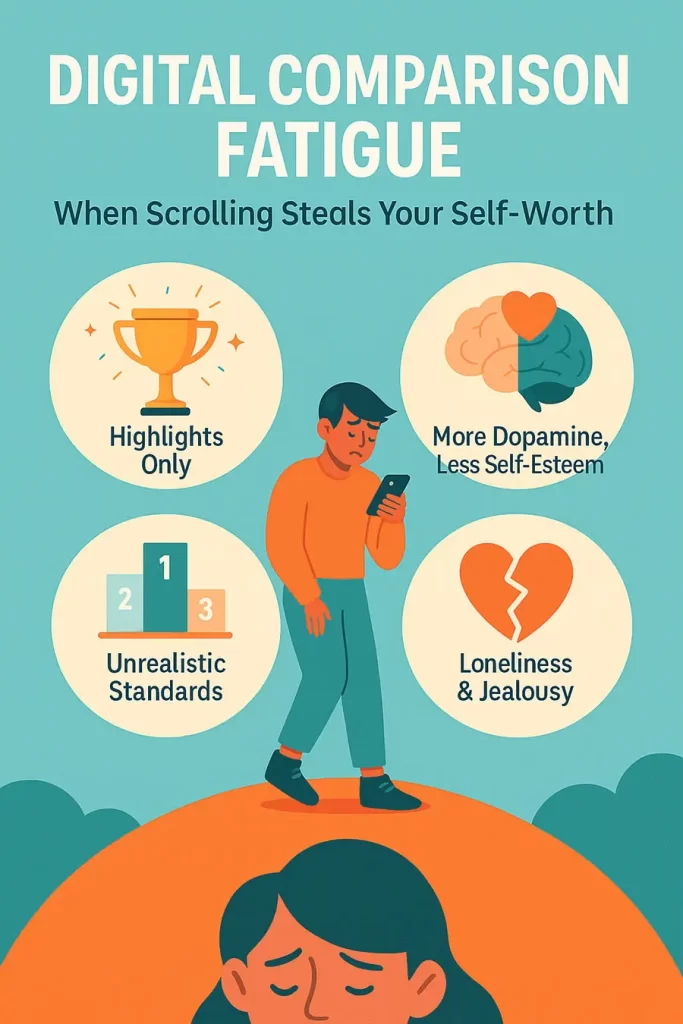
The Science Behind It
From a neuroscience perspective, comparison fatigue is tied to how your brain processes social information. When you see others’ “perfect” lives, your amygdala (emotion center) can interpret it as a threat to your belonging or status, triggering stress hormones like cortisol. Meanwhile, social media’s dopamine hits keep you scrolling, even when it hurts. Scientific American says this overstimulation can shrink your attention span and make decision-making harder, leading to mental fog.
A 2021 study in Cyberpsychology, Behavior, and Social Networking found that heavy social media use increases anxiety and lowers self-esteem, especially in young adults. Your brain’s not built to handle 500 highlight reels a day it’s like trying to drink from a firehose. Setting boundaries helps your brain reset, giving it space to focus on your life
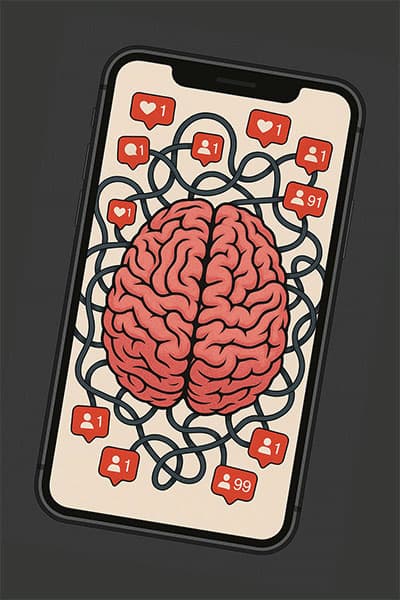
Conclusion
Digital comparison fatigue is like a quiet thief, stealing your self-worth one scroll at a time. It’s not your fault social media’s designed to keep you comparing, and our brains aren’t built for it. But you can take back control. By setting boundaries, curating your feed, and practicing self-compassion, you can stop measuring your life against others’ and start valuing your own. You’re not falling behind you’re just human in a hyper-digital world. So, take a deep breath, put down your phone, and remind yourself: you’re enough, just as you are.
Feeling drained by comparison? Try one tip from this article like unfollowing a triggering account and share your story in the comments. Let’s break the scroll cycle together! 😊

Resources related to this topic
- Psychology Today: Examines how excessive social media use is linked to anxiety, poor self-image, and lower well-being and offers control strategies .
- Healthline: Reviews research tying social media use to increased anxiety and emotional distress .
- Verywell Mind: Outlines how FOMO (fear of missing out) from social media fuels anxiety and offers detox techniques .
- Sleep Foundation: Details how screen-based blue light suppresses melatonin, delays sleep onset, and disrupts sleep cycles .
- Scientific American: Describes how big‑data analysis of social media posts reveals signs of depression and anxiety and helps track population‑level mental health trends .
Related articles I recommend not to miss

✨ Last updated on 03.08.2025
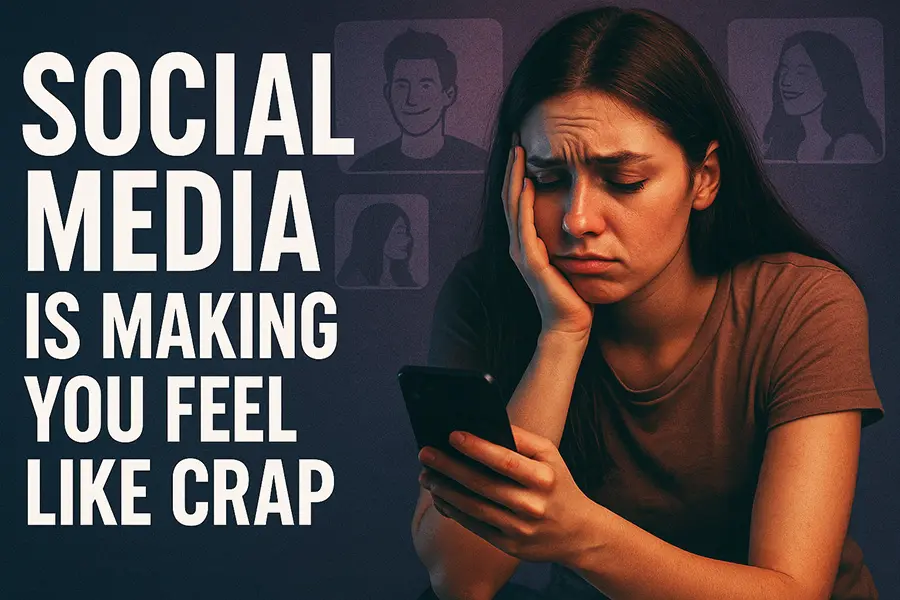




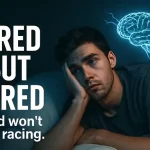





Leave a Reply